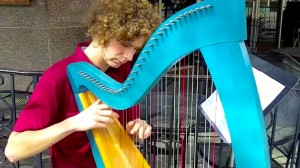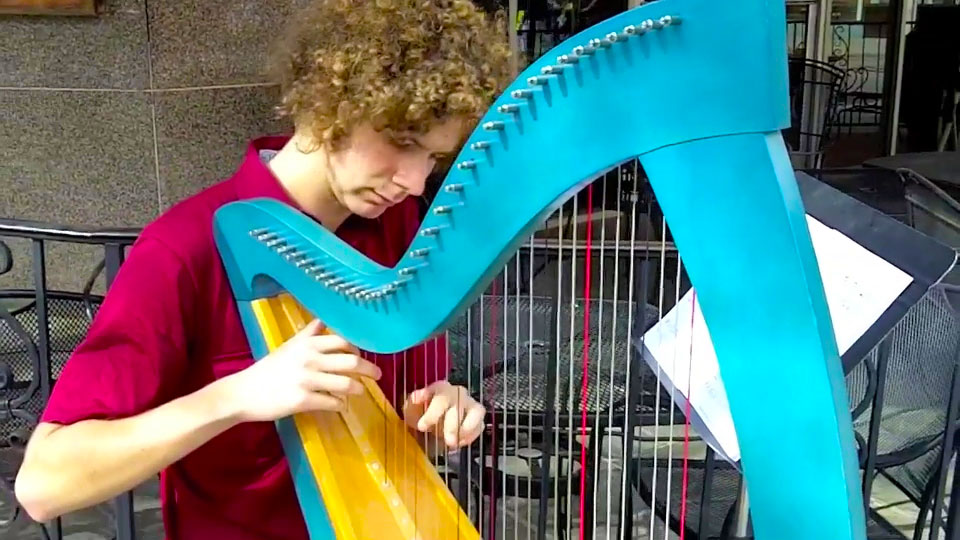
As you’re probably guessing, I found something that proves I’m actually remembering it wrong. And that’s exactly the case. I’m way, way off on this one.
While the original video is lost to the ether, I did manage to find the original audio. It tells a totally different story, and one filled with detail. It turns out that I did a passable interview with Jones in our brief encounter.
It began with him agreeing to play an original tune. It’s called “Circus Waltz.” Here’s the original recording.
While I remembered the conversation as somewhat terse, the audio reveals that we had a very pleasant chat. Jones was not only very forthcoming about his music, but actually quite friendly. I have no idea how I’d someone come to remember things so inaccurately.
So, let’s set the record straight.
Andrew Jones began playing harp about seven years before this video was filmed. He didn’t remember the exact moment he became interested in the instrument, but he did recall a few months of negotiations with his parents to allow him to begin taking lessons. His hometown has a “surprisingly big harp community,” he explained. “It wasn’t hard to find a place to rent a harp, or a harp teacher.”
What does he like about the harp? It turns out to be the same reason that most people like listening to it.
“I’ve played some other instruments, and I listen to a lot of types of music,” he said. “Nothing calms me down or puts me in the same peaceful mood that the harp does. It’s a very therapeutic instrument.”
There’s also something tactile to it. Jones also plays guitar and piano, but says that they “don’t feel as nice” on his fingers. To illustrate, he strummed a little. “That’s the nicest feeling I can have playing music.”
Jones plays a Lyon & Healy lever harp, which he described as being “like the Fender or the Steinway of harps.” His particular model is a folk, or Celtic harp.
“All Celtic harps are also known as lever harps, because of these levers on the side,” he said, pointing to the control. “If you engage those levers, it raises the notes a half-step. It’s smaller than the pedal harp, which is the type most people see. Those are bigger, and have at least another octave on them. They also have pedals to raise or lower the notes a half-step, giving you a full range. On a lever harp, you’re a little more restricted.”
At this point, I asked if he would mind me recording another tune. He agreed enthusiastically, and asked if I had any requests. I told him I was completely ignorant when it came to harp music, and said he should play a song he enjoyed playing. He thought for a moment, then said he knew exactly what to play.
“It’s called ‘Carolan’s Draught,’ and it’s by this dude Turlough O’Carolan,” Jones said. “He was a blind harpist in the late 1600s. He wrote a ton of great harp music. Some of it is kind of corny, and I don’t like to play it because I feel like a major cheeseball when I do. But I don’t think this one is corny.”
Since the source video was lost, I’ve combined this short piece with a segment of a film from the public-domain Prelinger Archives. Details can be found here.
At the time, Jones didn’t have a website. It’s nearly three years later, and he still doesn’t seem to have one. The best I can do for those of you who like his music is to provide his email address. It’s a doozy, too: andrew.andrew.andrewjones.jones@gmail.com.

You must be logged in to post a comment.